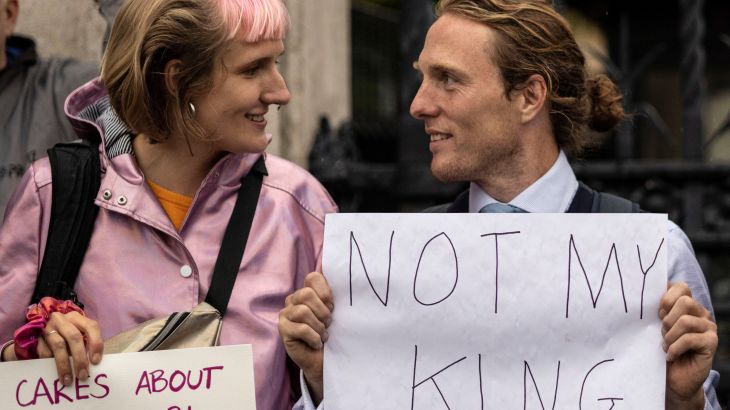Arrest of UK anti-royal protesters raises free speech concerns
British police have come in for criticism from activists and civil liberties groups over their treatment of anti-monarchy protesters.

British police have faced criticism from activists and civil liberties groups over their treatment of people who have publicly challenged King Charles III‘s accession to the throne after the death of Queen Elizabeth II, raising free speech concerns.
A woman in Edinburgh holding a sign reading “F*** imperialism, abolish the monarchy” was charged with a breach of the peace while another woman in London was moved from the gates of Parliament while carrying a “Not my king” sign.
Keep reading
list of 3 itemsCharles III arrives in Northern Ireland for first visit as king
Infographic: The UK’s royal line of succession explained
In recent days, police have arrested people protesting against the monarchy, raising questions about the authorities’ upholding of the freedom of speech. A man was charged with a breach of the peace after he heckled Prince Andrew as the queen’s hearse travelled through the Scottish capital.
In Oxford, peace activist Symon Hill was handcuffed after he shouted “Who elected him?” referring to Charles being proclaimed new king.

Hill said he was put into a police van by officers who told him he was being detained for alleged behaviour that could cause “harassment, alarm or distress”. He was later released, but could still face questioning.
“The police abused their powers to arrest someone who voiced some mild opposition to a head of state being appointed undemocratically,” he said.
The Edinburgh woman holding the sign was arrested at St Giles’ Cathedral in Edinburgh, where the queen’s coffin was kept before it was flown to London on Tuesday. “Let her go! It’s free speech!” one man yelled, reported The Scotsman daily.
Lawyer Paul Powlesland said he was questioned by police outside Parliament on Monday while carrying a blank piece of paper on which he, too, planned to write “Not my king.”
In footage shot by Powlesland, an officer is heard saying “it may offend someone” if he wrote the words. Powlesland called the police behaviour “outrageous.”
NotMyKing has become a trending hashtag on Twitter.
🔴An anti-Royal protestor holding a poster with the slogan ‘Not my king’ has been pictured being led away by police 👇 pic.twitter.com/qsur4TT6vz
— Evening Standard (@standardnews) September 12, 2022
The civil rights group Liberty said it was “very worrying to see the police enforcing their broad powers in such a heavy-handed and punitive way to clamp down on free speech and expression.”
Republic, a group that campaigns for the abolition of the monarchy, said it would be complaining to police “in the strongest possible terms,” and would organise protests at the king’s coronation in the coming months.
“Free speech is fundamental to any democracy,” said spokesman Graham Smith. “At a time when the media is saturated with fawning over a king appointed without discussion or consent, it is even more important.”
The arrests come after the government passed a contentious law-and-order bill that toughened police powers to limit disruptive protests. It is not clear whether any of the arrests involved the new law.
Prime Minister Liz Truss’s spokesman, Max Blain, said that while “this is a period of national mourning, and indeed grief, for the vast majority of the United Kingdom … the right to protest does remain a fundamental principle.”
But he said it is “for the police to decide what is appropriate in individual circumstances”.
London’s Metropolitan Police force said that “the overwhelming majority of interactions between officers and public at this time have been positive.”
“The public absolutely have a right of protest and we have been making this clear to all officers involved in the extraordinary policing operation currently in place,” said Deputy Assistant Commissioner Stuart Cundy.